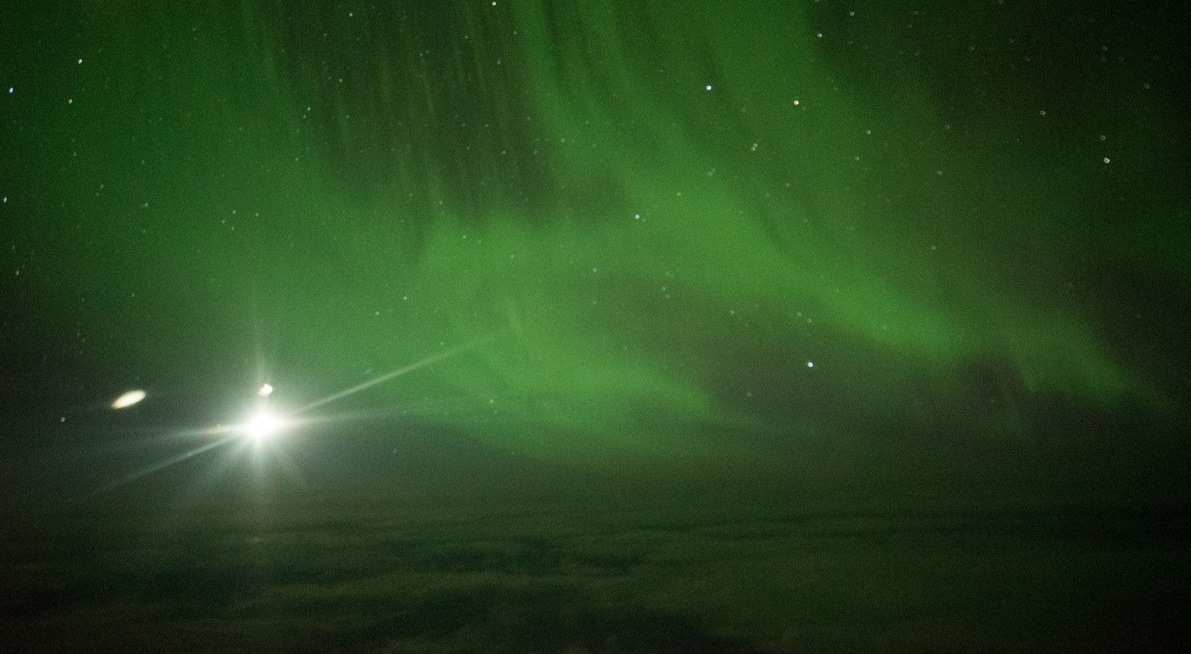Southern Lights stun passengers on world-first Aurora Australis flight
World-first as eight-hour flight chases nature's light display across the southern hemisphere

A free daily email with the biggest news stories of the day – and the best features from TheWeek.com
You are now subscribed
Your newsletter sign-up was successful
Passengers were left awestruck by the Southern Lights on the world's first commercial flight to view the Aurora Australis.
The eight-hour Boeing 767 flight took off from New Zealand on Thursday night and travelled towards the South Pole, flying to 62 degrees latitude and passing through the aurora several times.
Passenger Roz Charlton wrote on Facebook: "Our lives are forever altered by this incredible experience and we are eternally grateful to have been a part of this remarkable event."
The Week
Escape your echo chamber. Get the facts behind the news, plus analysis from multiple perspectives.

Sign up for The Week's Free Newsletters
From our morning news briefing to a weekly Good News Newsletter, get the best of The Week delivered directly to your inbox.
From our morning news briefing to a weekly Good News Newsletter, get the best of The Week delivered directly to your inbox.
Expedition leader Dr Ian Griffin told the BBC that thanks to some careful planning and flying, the "awesome" flight had ensured "a spectacular display" for everyone on board – the sold-out flight was deliberately half-empty so everybody could see out of the windows.
He added: "Nobody has ever really done that before. This was a world first. People have done it in the northern hemisphere.
"The aurora doesn't just appear in specific locations, it can move around a bit, and we were trying to chase it across the Southern Ocean, which was quite fun."
He added: "We've travelled two-thirds of the way to the South Pole, seen an incredible display of the southern lights, got lovely pictures and were home in time for breakfast."
A free daily email with the biggest news stories of the day – and the best features from TheWeek.com
-
 The Week Unwrapped: Do the Freemasons have too much sway in the police force?
The Week Unwrapped: Do the Freemasons have too much sway in the police force?Podcast Plus, what does the growing popularity of prediction markets mean for the future? And why are UK film and TV workers struggling?
-
 Properties of the week: pretty thatched cottages
Properties of the week: pretty thatched cottagesThe Week Recommends Featuring homes in West Sussex, Dorset and Suffolk
-
 The week’s best photos
The week’s best photosIn Pictures An explosive meal, a carnival of joy, and more
-
 Epstein files topple law CEO, roil UK government
Epstein files topple law CEO, roil UK governmentSpeed Read Peter Mandelson, Britain’s former ambassador to the US, is caught up in the scandal
-
 Iran and US prepare to meet after skirmishes
Iran and US prepare to meet after skirmishesSpeed Read The incident comes amid heightened tensions in the Middle East
-
 Israel retrieves final hostage’s body from Gaza
Israel retrieves final hostage’s body from GazaSpeed Read The 24-year-old police officer was killed during the initial Hamas attack
-
 China’s Xi targets top general in growing purge
China’s Xi targets top general in growing purgeSpeed Read Zhang Youxia is being investigated over ‘grave violations’ of the law
-
 Panama and Canada are negotiating over a crucial copper mine
Panama and Canada are negotiating over a crucial copper mineIn the Spotlight Panama is set to make a final decision on the mine this summer
-
 Why Greenland’s natural resources are nearly impossible to mine
Why Greenland’s natural resources are nearly impossible to mineThe Explainer The country’s natural landscape makes the task extremely difficult
-
 Iran cuts internet as protests escalate
Iran cuts internet as protests escalateSpeed Reada Government buildings across the country have been set on fire
-
 US nabs ‘shadow’ tanker claimed by Russia
US nabs ‘shadow’ tanker claimed by RussiaSpeed Read The ship was one of two vessels seized by the US military